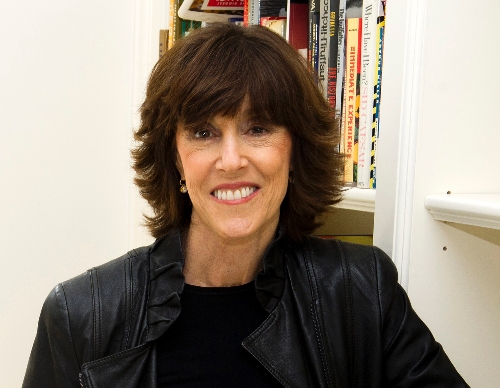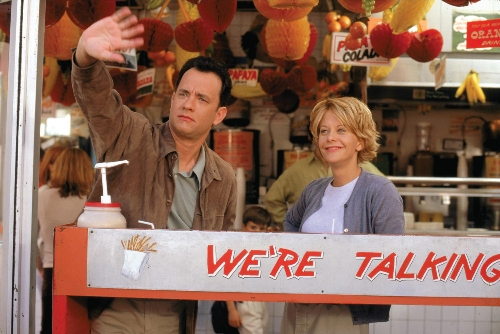Author, director Ephron dies of leukemia at 71
NEW YORK - Nora Ephron, the essayist, author and filmmaker who challenged and thrived in the male-dominated worlds of movies and journalism and was loved, respected and feared for her wit, died Tuesday of leukemia. She was 71.
Ephron's son Jacob Bernstein confirmed her death. Her book publisher, Alfred A. Knopf, also confirmed it in a statement.
Born into a family of screenwriters, Ephron was a top journalist in her 20s and 30s, then a best-selling author and successful director. She was among the most quotable and influential writers of her generation.
She wrote and directed such favorites as "Julie & Julia" and "Sleepless in Seattle," and her books included the novel "Heartburn," a brutal roman a clef about her marriage to Washington Post reporter Carl Bernstein, and the popular essay collections "I Feel Bad About My Neck" and "I Remember Nothing."
She wrote openly about her difficult childhood, her failed relationships, her doubts about her physical appearance and the hated intrusion of age.
Within the smart-talking axis of New York-Washington-Los Angeles, no one bettered Ephron, slender and dark-haired and armed with a killer smile. Friends from Mike Nichols and Meryl Streep to Calvin Trillin and Pete Hamill adored her for her wisdom, her loyalty and turns of phrase.
As a screenwriter, Ephron was nominated three times for Academy Awards, for "Silkwood," "When Harry Met Sally ..." and "Sleepless in Seattle," and was the rare woman to write, direct and produce Hollywood movies. Meg Ryan was among the many actresses who said they loved working with Ephron because she understood them so much better than did her male peers.
THE LAS VEGAS CONNECTION
Ephron made her directorial debut with the 1992 made-in-Las Vegas comedy "This Is My Life," which starred Julie Kavner as Dottie Ingels, a single mother trying to become a stand-up comedian; she eventually plays the Tropicana's Comedy Stop at the Trop, appearing on the marquee alongside "Liberace Mania." Ephron and her sister, Delia Ephron, adapted Meg Wolitzer's novel.
Ephron also visited Las Vegas frequently with husband Nicholas Pileggi, a writer whose credits include the 1995 movie "Casino" and the book that inspired it. Among their favorite local restaurants, according to Pileggi: Lotus of Siam in Commercial Center.
In a 2006 Huffington Post column, Ephron wrote about "My Weekend in Vegas."
It turned out to be a particularly eventful one, according to the column, because it included an audience with casino owner Steve Wynn, who was explaining secrets of his Picasso painting "Le Reve" when he "raised his hand to show us something about the painting - and at that moment, his elbow crashed backwards right through the canvas."
Ephron wrote: "I felt that I was in a room where something very private had happened that I had no right to be at. I felt absolutely terrible." And, at the same time, "I was holding my digital camera in my hand - I'd just taken several pictures of the Picasso - and I wanted to take a picture of the Picasso with the hole in it so badly that my camera was literally quivering. But I didn't see how I could take a picture - it seemed to me I'd witnessed a tragedy, and what's more, that my flash would go off if I did and give me away."
Those in the room all vowed not to reveal what had happened - but knew the incident would somehow go public. (Which it did, in a "charming" New Yorker article, Ephron wrote, "and as far as I'm concerned I am entirely released from my vow of silence on the matter.")
Ephron recalled other moments of her "Weekend in Vegas" with equal wit, extolling "the breakfast buffet at the Wynn, which is the greatest breakfast buffet in Las Vegas and therefore in the world. ... The day you die and go to heaven, there will not be a breakfast buffet as good as the one at the Wynn."
Ephron, the eldest of four children, was born in New York to screenwriters Harry and Phoebe Ephron, who moved to Beverly Hills, Calif., when she was 4. Words were the air she breathed. Regular visitors included "Casablanca" co-writer Julius Epstein, "Sunset Boulevard" collaborator Charles Brackett and the team of Albert Hackett and Frances Goodrich, who worked on "The Thin Man" and "It's a Wonderful Life."
Everyone was in "the business," the movies. "People who were not in the business were known as civilians," Ephron wrote in "I Remember Nothing."
Determined by high school to be a journalist, Ephron graduated from the single-sex Wellesley College in 1962, moved to New York and started out as a "mail girl" and fact checker at Newsweek. A newspaper strike at the end of the year gave her a chance. Victor Navasky, the future editor of The Nation, was then running a satirical magazine called the Monacle. He was working on a parody of the New York Post, "The New York Pest," and asked Ephron for a spoof of Post columnist Leonard Lyons.
She succeeded so well that the newspaper's publisher, Dorothy Schiff, reasoned that anyone who could make fun of the Post could also write for it. Ephron was asked to try out as a reporter. Within a week, she had a permanent job and remained there five years.
Ephron began writing for Esquire and The New York Times and developed a national following as a throwback to the prime of Dorothy Parker and S.J. Perelman and a worthy peer of such "new" and hip journalists as Gay Talese and Tom Wolfe. She covered political conventions, the feminist movement and Wellesley, which she labeled a factory for "docile" women.
LIFE BECOMES ART
By the 1970s, she had met and married Carl Bernstein, who teamed with fellow Washington Post reporter Bob Woodward on prize-winning coverage of the Watergate scandal that brought down President Richard Nixon. They married in 1976, and had two children, but love soon turned to hate - and matured into art. Ephron was pregnant with the second child when she learned Bernstein was having an affair, a betrayal that had its rewards, once she stopped crying.
She wrote "Heartburn," later a film starring Streep and Jack Nicholson and directed by Nichols, with whom she collaborated often. The book was so close to her life that Bernstein threatened to sue.
Another perk from her time with Bernstein: She sussed out that "Deep Throat," the unnamed and unknown Watergate source, was in fact FBI official Mark Felt. She would allege that she told countless people about Felt, who did not acknowledge his role until years later.
Her screenwriting credits included "Heartburn," the nuclear power drama "Silkwood" and the romantic comedy "When Harry Met Sally ..." She twice directed the team of Meg Ryan and Tom Hanks, in "Sleepless in Seattle" and "You've Got Mail," and also worked with John Travolta (in the fantasy "Michael"), Steve Martin ("Mixed Nuts") and Nicole Kidman ("Bewitched").
Ephron had a great nose for nonsense, but was enough a child of Hollywood to fall, and fall hard, for a happy ending. "Sleepless in Seattle," in which Ryan and Hanks play long-distance admirers who meet at film's end, was itself a tribute to how movies might tell us how to live. "Sleepless" was not only a remake of the sentimental "An Affair to Remember." Ryan and her best pal, played by Rosie O'Donnell, are seen watching "Affair to Remember," which inspires Ryan to suggest to Hanks that they meet on top of the Empire State Building, on Valentine's Day.
Ephron was married three times: to Dan Greenberg, Bernstein and, quite happily, to Pileggi, who survives her and whose book "Wiseguys" was adapted into the Martin Scorsese film "Goodfellas." Sisters Delia, Amy and Hallie Ephron also are writers .
In her essay "The O Word," Nora Ephron anticipated growing too old to make jokes about her age. She would be "really old," beyond sex in a hotel room, or even a frozen custard at Shake Shack. It would be nice if she believed in a higher being, but the phrase "everything happens for a reason" is a sermon that only annoys her.
Ephron wrote of summers in the Hamptons on Long Island when her children were little, of fireworks on the Fourth of July and picnics on the beach. She loved the sound of geese in mid-July - "one of the things that made the summers out there so magical." As she aged, the geese reminded her that summer will end, and so will everything else.
"I especially began to hate their sound, which was not beating wings - how could I have ever thought it was? - but a lot of uneuphonious honks," she writes. "Now we don't go to Long Island in the summer and I don't hear the geese. Sometimes, instead, we go to Los Angeles, where there are hummingbirds, and I love to watch them because they're so busy getting the most out of life."
Las Vegas Review-Journal writer Carol Cling contributed to this report.























